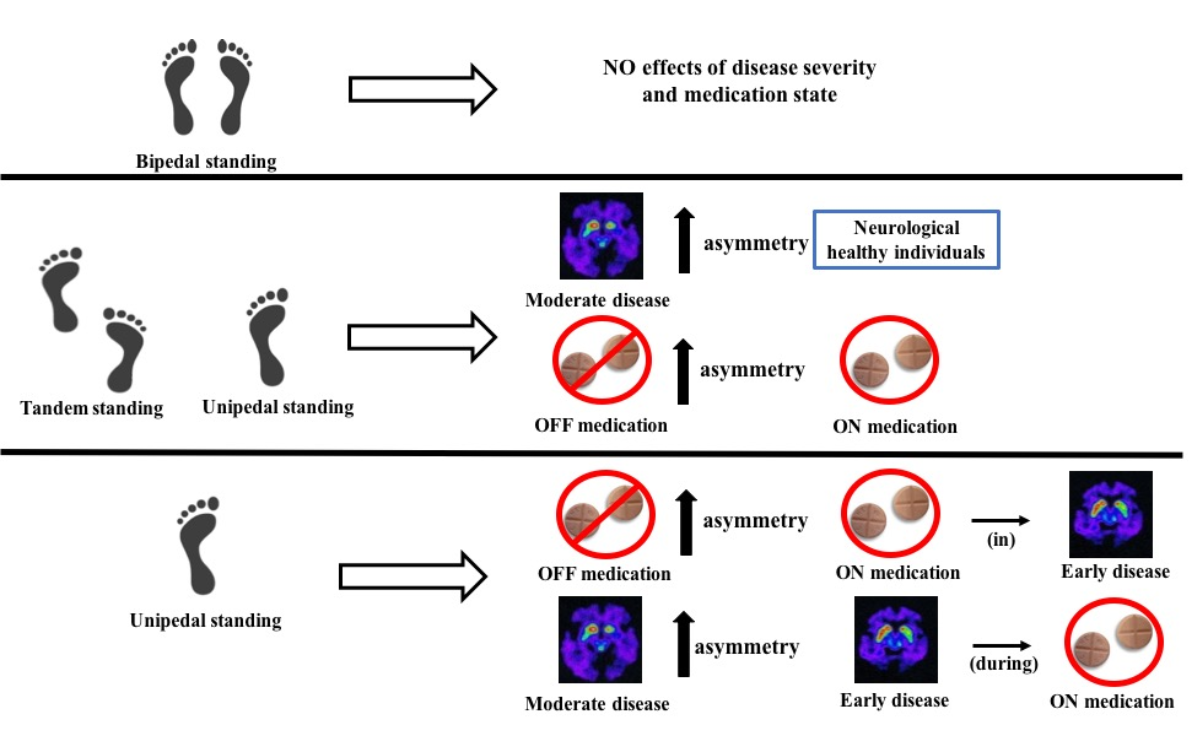People with Parkinson’s disease (PD) often exhibit substantial asymmetry in motor symptoms and postural control. This asymmetry is considered to remain unaltered with disease progression. A popular explanation for these motor and balance asymmetries is asymmetric dopaminergic degeneration in regions of the midbrain (i.e. substantia nigra). Dopaminergic treatment is frequently used to decrease motor asymmetry in PD. However, this pharmacological treatment does not appear to improve postural control asymmetry; in fact, dopaminergic medication often leads to increased muscular stiffness and poor responses to body sway. Postural control asymmetry increases as the postural task gets more difficult. Therefore, assessment under a more challenging postural task could elicit the effects of disease severity and dopaminergic medication on postural control asymmetry. Our aim was to investigate the effects of disease severity and medication state on postural control asymmetry during challenging tasks in individuals with PD.
Nineteen people with PD (8 individuals with early-stages PD and 11 individuals with intermediate-stages PD) and 11 control individuals participated in this study. They performed three standing task conditions: bipedal, tandem and unipedal standing. Participants stood on two force plates and we calculated the symmetric index for each trial to evaluate the asymmetry during standing. The PD group performed the tasks while ON and OFF their medication. Dopaminergic medication decreased postural control asymmetry in challenging postural tasks (tandem and unipedal tasks), mainly for individuals with early-stages PD (Figure). Individuals with intermediate-stages PD presented higher postural control asymmetry than the control group, and presented higher postural control asymmetry than those with early-stages PD while ON medication.

Figure. Summary of effects of medication state and disease severity for bipedal, tandem and unipedal standing. Asymmetry was higher during tandem and unipedal standing for those with more severe PD and OFF medication (panel 1 & 2). During unipedal standing, we found an interaction between disease severity and medication status (depicted by the horizontal arrows in panel 3) that indicated higher asymmetry in people with moderate PD and OFF PD medication.
In conclusion, postural control asymmetry during challenging postural tasks in people with PD was dependent on PD medication and disease severity. Dopaminergic medication was able to reduce postural control asymmetry during challenging postural tasks, especially for people with early-stages PD, but not during comfortable, bipedal standing. Moreover, a more challenging postural task revealed higher postural control asymmetry in people with intermediate-stages PD, mainly under the effects of PD medication.
Publication
Barbieri FA, Polastri PF, Baptista AM, Lirani-Silva E, Simieli L, Orcioli-Silva D, Beretta VS, Gobbi LT. (2016) Effects of disease severity and medication state on postural control asymmetry during challenging postural tasks in individuals with Parkinson’s disease.
Human Movement Science. 46:96-103. doi: 10.1016/j.humov.2015.12.009.
About the Author

Fabio A. Barbieri
Faculty of Science - Department of Physical Education – Human Movement Research Laboratory (MOVI-LAB)
My research interests are aimed at understanding the biomechanics and motor control of human movement, mainly walking and posture, in healthy individuals and people with neurodegenerative disorders such as Parkinson disease. Specifically, I want to determine how movements are planned, learned, and controlled.
This study presented here was performed under his supervision and funded by São Paulo Research Foundation (Grant number: 12/24040-9) and developed in the Human Movement Research Laboratory (MOVI-LAB).
Copyright
© 2018 by the author. Except as otherwise noted, the ISPGR blog, including its text and figures, is licensed under a Creative Commons Attribution-ShareAlike 4.0 International License. To view a copy of this license, visit https://creativecommons.org/licenses/by-sa/4.0/legalcode.
ISPGR blog (ISSN 2561-4703)
Are you interested in writing a blog post for the ISPGR website? If so, please email the ISGPR Secretariat with the following information:
- First and Last Name
- Institution/Affiliation
- Paper you will be referencing
